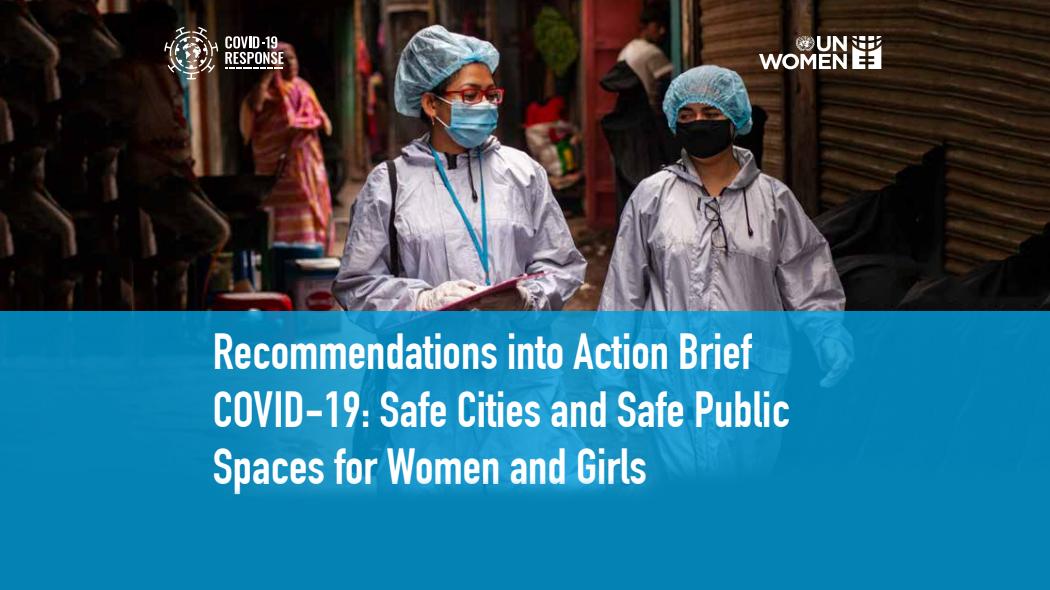The United Nations highlighted Bogotá's efforts to respond to sexual harassment in public spaces and other forms of violence against women by recognizing the Safe Spaces Strategy as one of the best practices implemented by cities around the world to prevent and address violence against women and girls. UN Women in the document called Recommendations in the COVID-19 Action Report: Safe Cities and Safe Public Spaces for Women and Girls, published on 21 December 2020 highlighted the gender-focused measures that Bogotá implemented to address them in the context of the challenges posed by the COVID-19 pandemic.
Safe Spaces Strategy
In the context of the coronavirus pandemic, the number of domestic violence cases and complaints in Bogotá has increased during confinements. As a result, there has been an increase in demand for institutional supply on both issues related to violence against women and information related to the promotion and guarantee of their rights. To address this situation, the Bogotá
Women's Secretary, in collaboration with UN Women, has developed the Safe Spaces Strategy, a joint effort between the Secretariat, the National Federation of Merchants of Colombia (FENALCO) and the Colombian National Police, where supermarkets, pharmacies, cafes and gas stations provide guidance and protection to women victims of gender-based violence who come to their stores seeking help and safety. Today there are more than 630 safe spots for them around the city.
How does it work?
If a woman is experiencing a situation of violence, she can go to one of the 630 stores to get to safety, then she can contact the manager who will propose two options: 1) If the person in charge considers that the woman is at risk of her life, call the police to protect her and activate the Referral Route. The manager then reports to the Women's Secretary to follow up on the case. 2) If the woman only wants information, the manager provides it to her, takes her name and phone number to report it to the Women's Secretariat.
Once the Secretary receives the report directly from the store, it immediately communicates the case to its team of psychologists and lawyers, which includes professionals from the Equal Opportunity Houses in the Localities, the Houses of Justice, the Centers of Attention of the Public Prosecutor's Office and the Purple Hotline.
This strategy seeks to allow women victims of violence, when it is not easy for them to move away from their aggressor, from their homes to a "Safe Space". The aim is also for stores to become channels of dissemination, so that citizens have access to key information to report or denounce a case of violence.
Other actions
In addition to the Safe Spaces Strategy, Bogotá has developed innovative programs and actions in the fight against violence against women in the context of the COVID-19 pandemic, including:
- Virtual care strategies and mechanisms for women were strengthened and adapted to the new reality of the pandemic.
- Increase call attention in the Purple Hotline: increasing from 30% to 89% in response effectiveness. To do this, the joint was carried out with Emergency Line 123 with 24-hour care.
- 224% increase in psychological and legal care and follow-up to women victims of violence who were being treated.
- For the first time, the Women's Secretary managed to have a presence in five hospitals and health centers. Currently, with an 8-hour care, but the goal is to increase it to 24 hours during 2021.
- Recently 10 health units assist women victims of domestic violence, providing the first medical care to women victims of violence or at risk of femicide.
- The Safe Houses strategy was a safe shelter pilot with flexible requirements. During quarantine, all women with protective measures found a place through this program.
- More than 85,000 women were served in all services provided for the protection of women during 2020.






